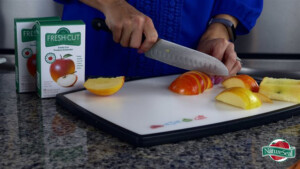Easy changes to your routine for a healthier lifestyle

(BPT) – It’s natural to want to eat healthy and fuel your body with the nutrients it needs to feel good. Figuring out how to eat healthy and make smart choices can be difficult if you don’t know where to begin. Try these five simple tips to introduce better habits into your diet.
Plan ahead
Planning is important for healthy eating, and even more so when you’re busy and time is limited. Start by choosing a consistent day to plan all your meals for the week, then check inventory in the fridge, freezer and pantry before making a grocery list. Always keep some healthy and easy shelf-stable or freezer meals on hand for busy days, and if you’re making a meal or snack that is freezable, double the recipe so you have it on standby.
Build a balanced plate
Easily build a healthy and balanced plate, without pulling out measuring cups or a scale, with these easy to eyeball proportions: fill half your plate with vegetables, a quarter with healthy carbs, a quarter with lean protein and a small dollop of healthy fats. Make sure your diet is diverse and eat from all five food groups, enjoying a wide range of vegetables, fruits, lean meats, fish, eggs, nuts, seeds, whole grains and naturally lower-fat dairy foods across each week.
Fill up on fruits and vegetables
It’s recommended that adults eat at least five portions of fruits and vegetables every day. Fruits and vegetables are healthy snack alternatives to foods like pretzels, sweets and chips. To ensure you always have healthy food options ready for snacking, chop and prep your fruits and veggies using NatureSeal Fresh-Cut Solutions Produce Extender as soon as you get home from the store. It keeps fresh cut produce like apples, carrots, celery, pears and peaches from browning while maintaining the texture and without altering the flavor. It keeps produce fresh in your fridge for up to one week helping you ensure healthy snacks are always readily available. There is a similar product for avocados that keeps your guacamole from turning brown.
Cut down salt and sugar
Regularly eating foods high in sodium and sugar may affect long-term health. However, consuming both in moderation is OK. Most dietary sodium and added sugars come from eating packaged and prepared foods, so learning how to read food labels will help you stay on track. Visit the FDA.gov website for more details on how to properly use the Percent Daily Value on the Nutrition Facts label as a tool to determine if a serving of the food is high or low in sodium or added sugars.
When eating out, make healthy choices
Despite your best efforts to plan, sometimes you end up getting take-out or eating out at a restaurant. This doesn’t mean you have to abandon your healthy eating habits. A few easy and healthier choices include asking for dressing on the side; choosing baked, broiled or grilled options instead of fried; and asking for water instead of sodas and other sweetened beverages. Finally, if you’re not too hungry or the serving size is large, simply divide your plate into two servings and save half for another meal.
Making dramatic changes to your diet all at once can be hard to swallow, literally. Keep these tips in mind and try incorporating them into your daily routine gradually for a healthier lifestyle.
Article source is Brandpoint.
Articles posted on this site are the works of their respective authors. They may be for informational or entertainment purposes and do not necessarily represent the views of this website nor imply endorsement by this website, nor endorsement of this site by the authors, nor do we get paid for posting articles. Nothing herein is intended to diagnose, treat or cure any disease. Please do your research and seek professional advice before using any information.

